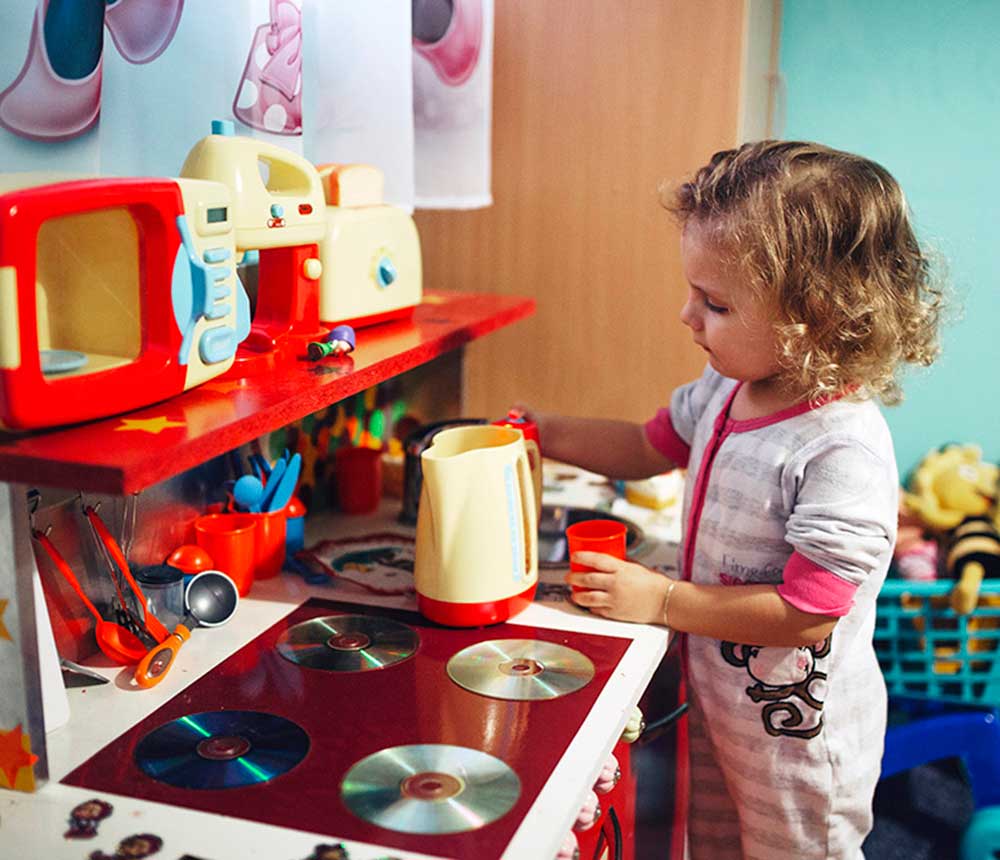
Oyuncak Mutfakların Çocuklar İçin Faydaları Nelerdir?
Çocuklar, yaratıcı oyunlarda farklı roller ve senaryolar katarak oynamayı severler. Oyun mutfakları, çocuklara aşina oldukları durumları taklit etme fırsatı verdiği için özellikle rol yapma oyunu için popüler bir kaynaktır. Evde baş aşçı, garson, mutfak görevlisi veya ebeveyn rolünü oynamayı çok seven çocuklar, oyun mutfakları ile kendilerini yeni rollerde hayal ederek ve heyecan verici senaryolar hazırlamalarına izin verir.
Mutfak oyuncakları ile oynamak sadece çocuklar için eğlenceli bir aktivite değildir, aynı zamanda bir çocuğun gelişimine de fayda sağlayan bir aktivitedir. Küçük çocuklar oyun yoluyla öğrenirler ve her zaman keşfedip deneyler yaparlar. Bu nedenle, oyun mutfaklarının çocuklara sağladığı temel faydaların bir listesini aşağıda bulabilirsiniz.
Oyun Mutfaklarının ve Mutfak Oyuncaklarının Çocuklar İçin Faydaları
Yaratıcılık ve Hayal Gücü
Mutfak oyuncakları ile rol oyunları oynamak çocukların hayal gücünü genişleten ve yaratıcılıklarını zenginleştiren heyecan verici ve eğlenceli bir aktivitedir. Çocuklara kendi yaratıcı tariflerini oluşturma ve farklı taklit malzemeleri keşfetme şansı verir.
Gördükleri yetişkinlerin eylemlerini taklit ederek ya da kullandıkları nesneler için kendi kullanımlarını formüle ederek, hayali senaryolar yaratmak için çeşitli mutfak oyuncaklarını denemekten zevk alırlar.
Dil ve İletişim
Rol yapma, çocuklara kendilerini yaratıcı bir şekilde ifade etme ve hikaye anlatma ile meşgul olma fırsatı verir. Çocuklar oynadıkları rolü sesli olarak canlandırarak dil gelişimlerini ve iletişimlerini geliştirir.
Mutfak oyuncakları ve mutfak oyunları, bir çocuğun yeni nesnelerin ve yiyeceklerin adlarını öğrenmesine sebep olur. Aynı zamanda “pişirmek” ve “karıştırmak” gibi yeni fiilleri ve “sıcak” ve “soğuk” gibi karşıt kelimeleri kullanırken çocuğun kelime hazinesi de genişler.
Sosyal Beceriler ve Takım Çalışması
Oyun mutfakları ve mutfak oyuncakları küçükleri diğer çocuklarla oynamaya teşvik ederek sosyal gelişimlerini arttırır. Kimin hangi rolü oynayacağı, neyi pişirmeleri gerektiği ve bunu nasıl yapacakları konusunda tartışmalar yaratırlar.
Bu sayede bu durum çocukları bir ekip olarak çalışmaya ve işi daha hızlı yapabilmeleri için işbirliği yapmaya teşvik eder. Onları paylaşmaya, sırayla yapmaya ve başkalarının ne pişirecekleri hakkındaki fikirlerini dinlemeye teşvik eder.
Planlama ve Organizasyon
Çocuklar tipik olarak oyuncak mutfaklarını ve mutfak oyuncaklarını düzenleme sürecinden zevk alırlar. Farklı rolleri belirleme ve farklı yiyecek türlerini bölümler halinde düzenleme onlara oldukça keyif verecek ve çokça zaman harcayacaklardır.
Oyun mutfağı organize edilirse, mutfak oyununun daha eğlenceli bir aktivite haline geldiğini keşfetme eğiliminde olacaklardır. Çocuklar oyuncak mutfak malzemelerini dolaplarda saklayabilir ve konukları için tabak ve çatal-bıçak takımlarını düzgün bir şekilde düzenleyebilir. Bu sırada ne yapacaklarını ve kimin hangi yemeği yapacağını planlarken organizasyon yeteneklerini de geliştireceklerdir.
Yaşam Becerileri
Çocuklar mutfak rol oyununa başladıklarında gerçek hayattaki meslekleri ve aşina oldukları durumları canlandırırlar. Bu, çocuklara dünyayı anlamalarını zenginleştiren ve yaşam becerilerini geliştiren temel yemek pişirme ve temizlik kavramlarını öğretir.
Masayı kuruyor, bulaşıkları yıkıyor ya da kek pişiriyormuş gibi yapıyor olsalar da, mutfakta rol yapma oyunu başkalarına karşı empatilerini artırma eğilimindedir çünkü bu onlara mutfakta yemek yapmanın ya da şef olarak çalışmanın nasıl bir şey olacağı konusunda bir fikir verir.
Bağımsızlık ve Kendine Güven
Çocuklara kendi oyuncak mutfağını sağlamanız, onlara bağımsızlık duygusu vererek özgüvenlerini artırır. Bu sayede çocuklar bir mutfakta çalışma rolünü tam olarak benimser ve onu temiz tutmaktan, eşyaları organize etmekten ve mutfaktaki farklı eşyaların bakımını yapmaktan sorumlu olurlar.
Çocuklar gerçek hayattaki mutfak rollerini üstlendiklerinde ve baş aşçılar gibi üstün roller oynadıklarında, aynı zamanda liderlik nitelikleri de geliştirmeye başlarlar.
Problem Çözme
Mutfak rol oyunları, bir çocuğun bilişsel yeteneğini ve problem çözme becerilerini geliştirir. Çatalın kaybolması gibi sorunlar ortaya çıkması, çocukları bir çözüm bulmaya zorlar. Çatalı başka bir şeyin yerine koymak veya kaybolan öğeyi bulmak için kendi çözümlerini üretmek zorunda olan çocukların problem çözme yetenekleri de gelişir.
Sayısallık
Oyuncak mutfaklar da bir çocuğun matematik becerilerini geliştirmeye yardımcı olur. Çocuklar kaç tabağa ihtiyaç duyduklarını sayabilir, malzemeleri tartabilir veya yiyeceğin fırında kaç dakika beklemesi gerektiğini sayabilir, bu da oyun oynarken matematiksel öğrenmelerini geliştirir.
Görsel Tanıma
Oyuncak mutfaklar, çocuklara yeni nesneler ve yiyecekler belirleme fırsatı verir. Oyuncak mutfaklarda çeşitli eşyalar bulundurabilirsiniz, bu da çocuklara farklı yiyecek türlerini ve mutfak eşyalarını kategorize etme şansı verir.
Sağlıklı Yemek Seçenekleri
Meyve, sebze, yumurta ve et gibi farklı türde oyuncak yiyecekleri rol oyunlarınıza katarak çocukları daha sağlıklı yiyecek seçimleri yapmaya teşvik edebilirsiniz. İştah açıcı senaryolarda pişirdikleri yemekleri hayal ederler, bu da onları gerçek hayatta da o yemeği sevmeye ve yemeye teşvik eder.
Motor Yetenekleri
Oyuncak mutfaklar aynı zamanda bir çocuğun ince motor becerilerini geliştirmeye yardımcı olur, çünkü mutfak eşyaları ve araçları oyun ortamlarında kullanarak çeşitli aktiviteler gerçekleştirirler.
Şimdi küçük önlükleri takma ve oyuncak mutfaklarda nefis yemekler yaratma zamanı!
Mutfak oyuncakları kategorimizi inceleyerek çocuğunuza uygun birçok mutfak oyuncağı ve oyuncak mutfak setlerini satın alabilirsiniz.
